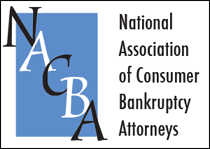
Frequently Asked Questions
If you have more questions you can't find answered here, please email us HEREWhat is the difference between chapters?
We provide two different types of consumer bankruptcies-- Chapter 7 and Chapter 13. Chapter 7 is the "Start Fresh" bankruptcy. It will get rid of credit card debt, medical debt, old auto repossession charges and debts from lease or apartment deficiencies. It may also get rid of old personal income taxes (Come in to see if your taxes qualify). Chapter 13 is like a Chapter 7 "plus". If you qualify for a Chapter 7, it can do everything a Chapter 7 can and more. It may allow you to "cram down" the price of your car to its true value (rather than what you owe on the contract) and might allow you to "strip off" a 2nd mortgage and get rid of it like a credit card. It may also allow you to pay off IRS tax debt or credit card debt at no interest.
What is the benefit?
Immediately after filing and giving notice to your creditors, the calls will stop. The foreclosure will stop. There will be no repossession or eviction. This "stay" allows time for you to get things in order and either make payments or arrange for an orderly return of property. And surprisingly, your credit rating will start to rise sharply after filing and discharge, causing you to possibly have a better credit rating than if you'd paid all your creditors off.
Will a bankruptcy stop lawsuits and will it stop garnishments?
Yes--almost immediately for just about all lawsuits and garnishments. The "stay" as mentioned above, gives you some breathing room so we can look at your financial situation and see if we can get rid of the judgments or possibly pay them off over a longer period of time with no interest. Garnishments can take up to 25% of your gross income. If you get a court summons, come to us at Lauber Dancey to discuss your options. It costs you nothing and may save you a lot.
Will I lose my home? My car?
If you are current on your home and we can protect the equity, you won't lose your home. If you are current on your car, you won't lose your car. One of the first questions the attorneys at Lauber Dancey will ask is "What are your goals?" Do you want to keep your home? Do you want to keep your car? We will give you all the options so you can make the decision that is right for you and your family. And if the creditors are knocking because you are behind, we can protect your home and car by forcing your creditors to accept a longer payment through the bankruptcy court.
My car was just repossessed! Can I get it back?
Yes! But you must move quickly. Get proof of insurance and make an appointment with Lauber Dancey immediately. We can get your car back within 10 days by filing a Chapter 13 bankruptcy. As long as the car hasn't been sold by the dealer, you can get your car back and make long term payments on that car, normally at a lower interest rate.
Will I lose my retirement?
No! I cringe when people tell me they emptied out their retirement account to pay unsecured debt. You are leveraging you and your family's future when you do that. Creditors rarely go out of business. Other than mortgage companies (who took business advantage of the bankruptcy code), have you seen any credit card companies go under? They don't because their interest calculations include a number of consumers filing for bankruptcy. They charge enough to pay off the principal, pay themselves and pay an often usurious rate of interest. If circumstances force you to consider filing bankruptcy, please look at this as a business decision. Your main job is to take care of yourself and your family--the credit card companies will take care of themselves, believe me.
Is preparing a bankruptcy a difficult process?
At Lauber Dancey, we understand you are trying to take care of your responsibilities and may find it difficult to commit to long office appointments where you pay $20 for parking. We are a mobile company who can come to you! Once retained, we can handle most business by email or phone. We can draft the documents, bring them to you for signature and the only physical obligation you would have is to attend a short meeting to be examined by your trustee.
How long does bankruptcy take?
Chapter 7s are normally about 4 months, and Chapter 13s are normally 3-5 years. We at Lauber Dancey are with you the entire time for both Chapters.
Will someone find out?
No one will find out that you don’t tell yourself, or that isn’t specifically looking for that information. While bankruptcy filings are public record, they are difficult to locate and can usually only be found by someone who is looking and willing to spend time and effort. No one will call you or your employer or visit your home.
What happens to my student loans?
At this time, student loans are not dischargeable in bankruptcy absent very compelling circumstances. We are carefully monitoring the law for changes in the code and more favorable rulings in the local Court rooms in case where student loans are at issue. What we are advising is for clients to remove all other debt from the equation in order to focus on paying off non-dischargeable debt. Discharge your credit cards and medical bills so you can focus on your student loans.
Will bankruptcy eliminate child support or alimony?
While bankruptcy will not eliminate either support or alimony, it can spread them out over the next 5 years and give you some breathing room if you are struggling to pay off the debt immediately. I've lost my driver's license because of tickets.
Can bankruptcy help?
Absolutely. We can set up a long term plan to pay back those tickets and get your license back almost immediately. The Department of Licensing is accustomed to seeing bankruptcy petitions and will normally grant your license back quickly once they are assured you will be making payments on those tickets.
Can I buy a house after bankruptcy?
I've heard of people buying a home as soon as 1 years after discharge, but I believe 2 years is more the norm. Once you have discharged your unsecured debt, you'll find it much easier to save for a down payment. And when you have little debt and a down payment, banks may find it much easier to loan you money for a home.
Can I get fired if I file bankruptcy?
No! It is against the law to discriminate against you if you file bankruptcy. Employers may not fire you if you file either Chapter 7 or Chapter 13 while you are in their employee.
Can a married couple file separately?
Yes--we can discuss your personal strategy at Lauber Dancey so you receive the outcome you want. Perhaps it makes sense for you to leave one spouse open to borrow money or buy on credit while you make a fresh start with the other spouse. If the debt is shared, maybe both should file. There is no difference in attorney's fees for a married couple or an individual.
How can I afford an attorney?
I always equate hiring an attorney with doing electrical work in my home. I could do it myself if I were willing to put in the time and effort to learn how--all the information is out there for me; I just don't know if I'd want to. You can represent yourself in your proceedings, but I would urge you to talk to us first. Learn as much as you can before touching that wire.
Will bankruptcy get rid of IRS Debt?
In certain cases, a bankruptcy may help you discharge very old debt. Only an attorney can advise on your individual situation, schedule an appointment with a Lauber Dancey attorney today to find out more.
How does bankruptcy affect my credit score?
Some of our clients report their credit score actually improves immediately after a bankruptcy, once the debt has been eliminated. It does take careful planning and time to recover a good credit profile. An attorney at Lauber Dancey will help you understand the path to building post-bankruptcy credit repair.
Does filing bankruptcy help your finances?
Filing a bankruptcy may be a strategic way to manage your financial life. For example, if you are struggling with student loan debt, even though it is not dischargeable in a Chapter 7, the elimination of other financial worries may enable you to focus on the debt you can’t get rid of. Most people live on fixed finances and are forced to make choices and prioritize the distribution of their income. A bankruptcy may help synthesize your debt to a manageable level.

